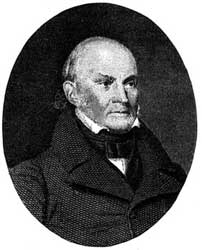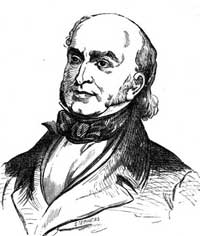| John Quincy Adams followed in his father's footsteps and became the sixth President of the United States. Besides the current President, he was the only son of a President to also become President.

Both John Adams and John Quincy Adams were born in Quincy, Massachusetts. He began his career at the age of 12 when he went to Europe with his father. John Quincy Adams served as a French translator to Francis Dana, who was United States minister to Russia. He also served as his father's secretary during the peace negotiations that ended the American Revolution. He accomplished all of this before he was 17 years old. Later, he graduated from Harvard College with a law degree and opened an office in Boston.

 Adams' "Publicola" essays, which attacked Thomas Paine's views in the "Rights of Man," earned him political recognition. In 1793, George Washington appointed him minister to Holland and later sent him to London to help John Jay in negotiations. These negotiations led to Jay's Treaty. Adams' "Publicola" essays, which attacked Thomas Paine's views in the "Rights of Man," earned him political recognition. In 1793, George Washington appointed him minister to Holland and later sent him to London to help John Jay in negotiations. These negotiations led to Jay's Treaty.
Adams was elected to the Massachusetts Senate in 1801 and to the United States Senate in 1803. His support of the Louisiana Purchase and endorsement of Jefferson's commercial warfare policy resulted in a break of the Federalist Party and his resignation in 1808. In 1809, Madison appointed Adams as minister to Russia. Later, he was one of the delegates sent to Ghent to negotiate the end to the War of 1812. He approved the peace treaty of 1814, which fell short of United States expectations. In 1815, Adams was appointed minister to Great Britain. As minister to Great Britain, he eased the tensions resulting from the war.
President James Monroe appointed John Quincy Adams as secretary of state in 1817. Monroe relied heavily on his advice. Monroe supported Adams when he forced Spain to cede Florida and make a settlement of the Louisiana boundary in the Transcontinental Treaty, drafted in 1819. The treaty, which concluded in 1822, did not accomplish all he wanted it to accomplish.
Adams' efforts to persuade Great Britain to open its West Indian trade to American ships were also unsuccessful. He also helped to formulate the Monroe Doctrine, urging Monroe to add that the United States regarded the Western Hemisphere as closed to further European colonization.

 In the 1824 Presidential election, Andrew Jackson had the most electoral votes but did not have the majority. Therefore, the vote was decided in the House of Representatives and John Quincy Adams was elected President. Henry Clay's support did much to get Adams elected by the House of Representatives. Later when Adams appointed Clay as secretary of state, his foes accused him of making a "corrupt bargain." The hostility of Jackson and Crawford supporters in Congress prevented Adams from executing his nationalist program. In 1828, Adams signed the Tariff of Abominations, which alienated the South. He lost the presidential election to Andrew Jackson in 1828. In the 1824 Presidential election, Andrew Jackson had the most electoral votes but did not have the majority. Therefore, the vote was decided in the House of Representatives and John Quincy Adams was elected President. Henry Clay's support did much to get Adams elected by the House of Representatives. Later when Adams appointed Clay as secretary of state, his foes accused him of making a "corrupt bargain." The hostility of Jackson and Crawford supporters in Congress prevented Adams from executing his nationalist program. In 1828, Adams signed the Tariff of Abominations, which alienated the South. He lost the presidential election to Andrew Jackson in 1828.

After serving one term as President, he was elected to the House of Representatives in 1831. Adams served eight terms as a member of the House. He chaired the Committee on Manufacturers, which drafted tariff bills, for 10 years. Although he was not an abolitionist, Adams was against slavery and attacked all measures that would extend it. Every year from 1836 to 1844, he tried to lift the gag rule which tabled all resolutions concerning slavery. In 1844, he finally succeeded. Adams was also one of the leading defenders of Freedom of Speech.
In 1848, John Quincy Adams suffered a stroke while on the floor of the House of Representatives. He died 2 days later without ever regaining consciousness. Adams was a vigorous speaker which earned him the nickname of "Old Man Eloquent".
|

